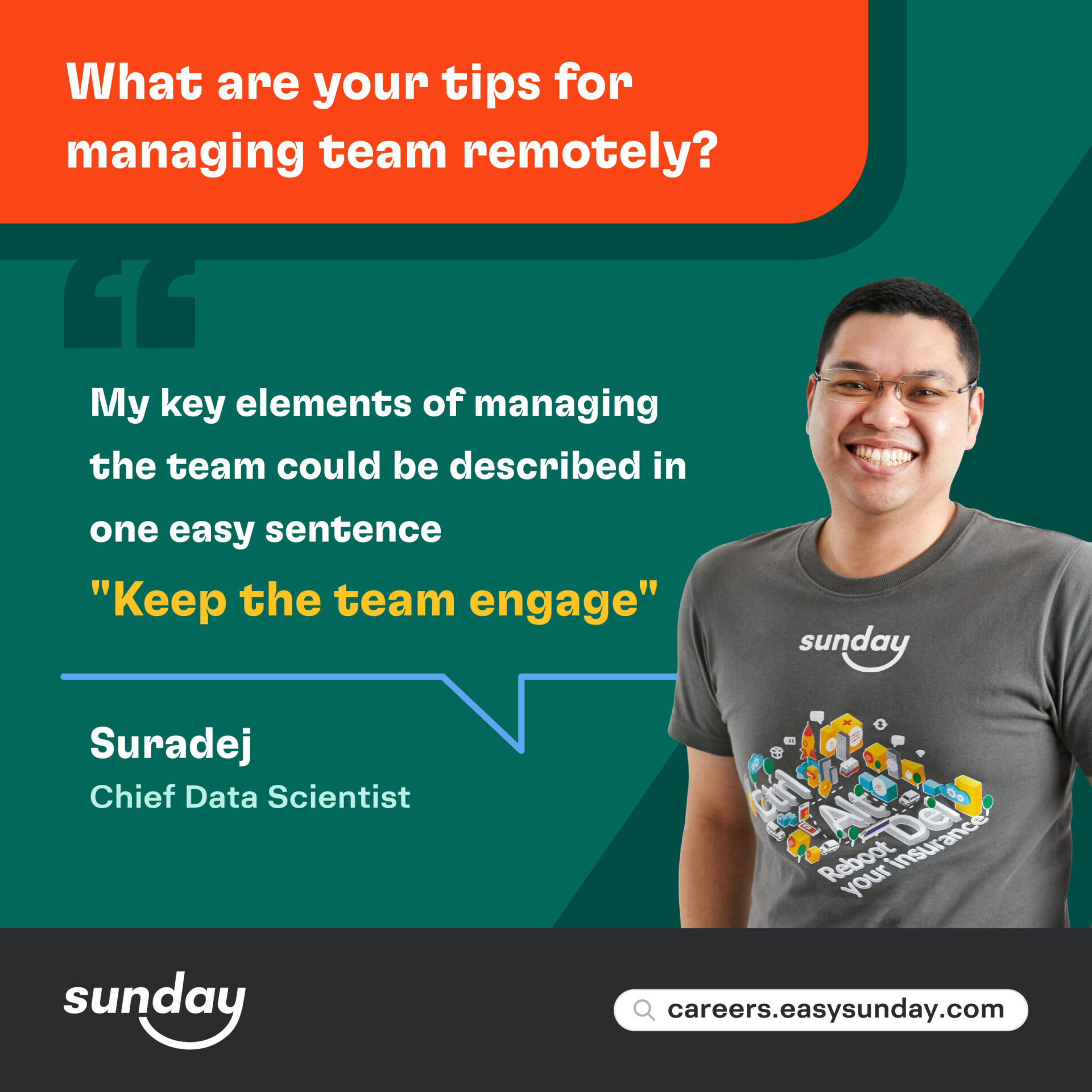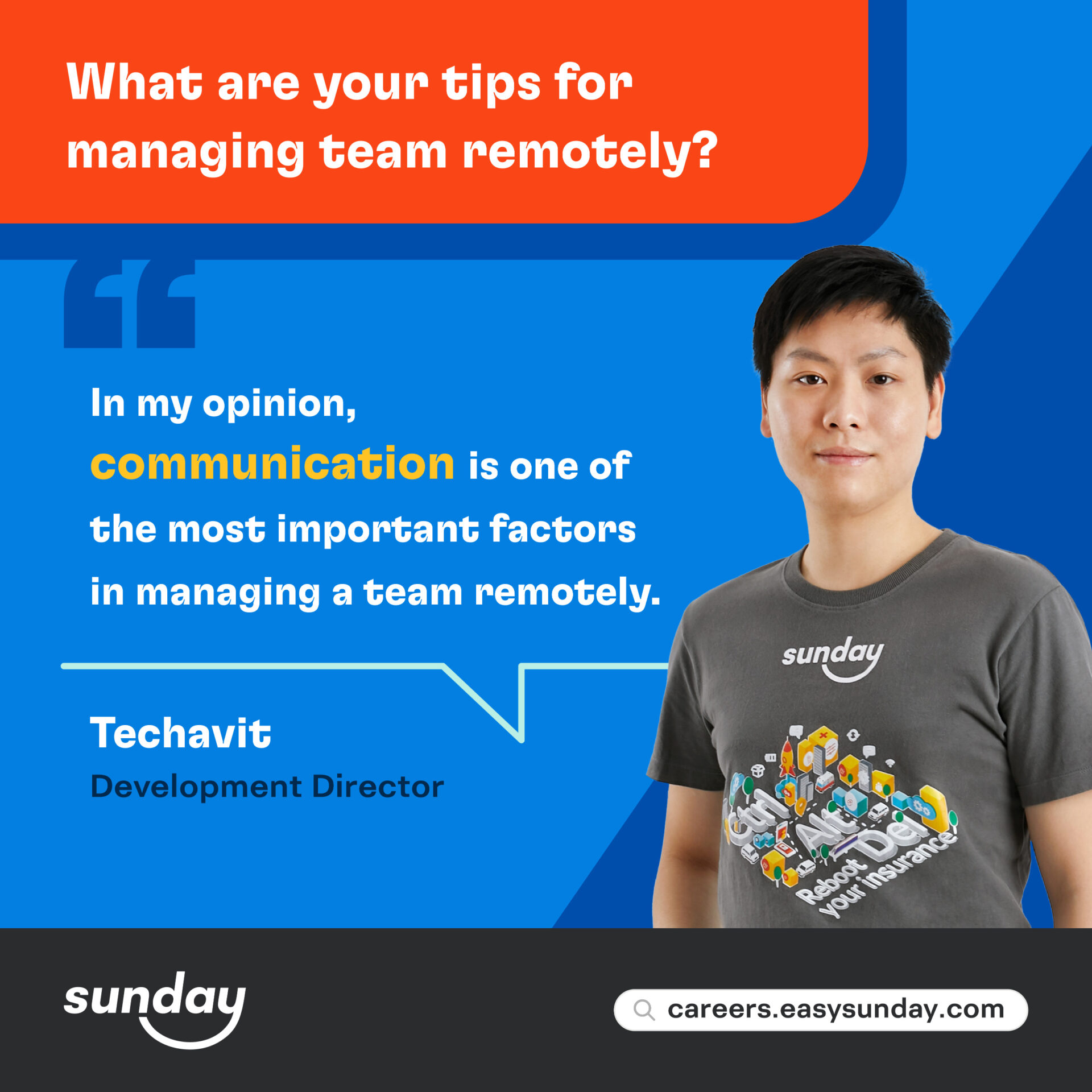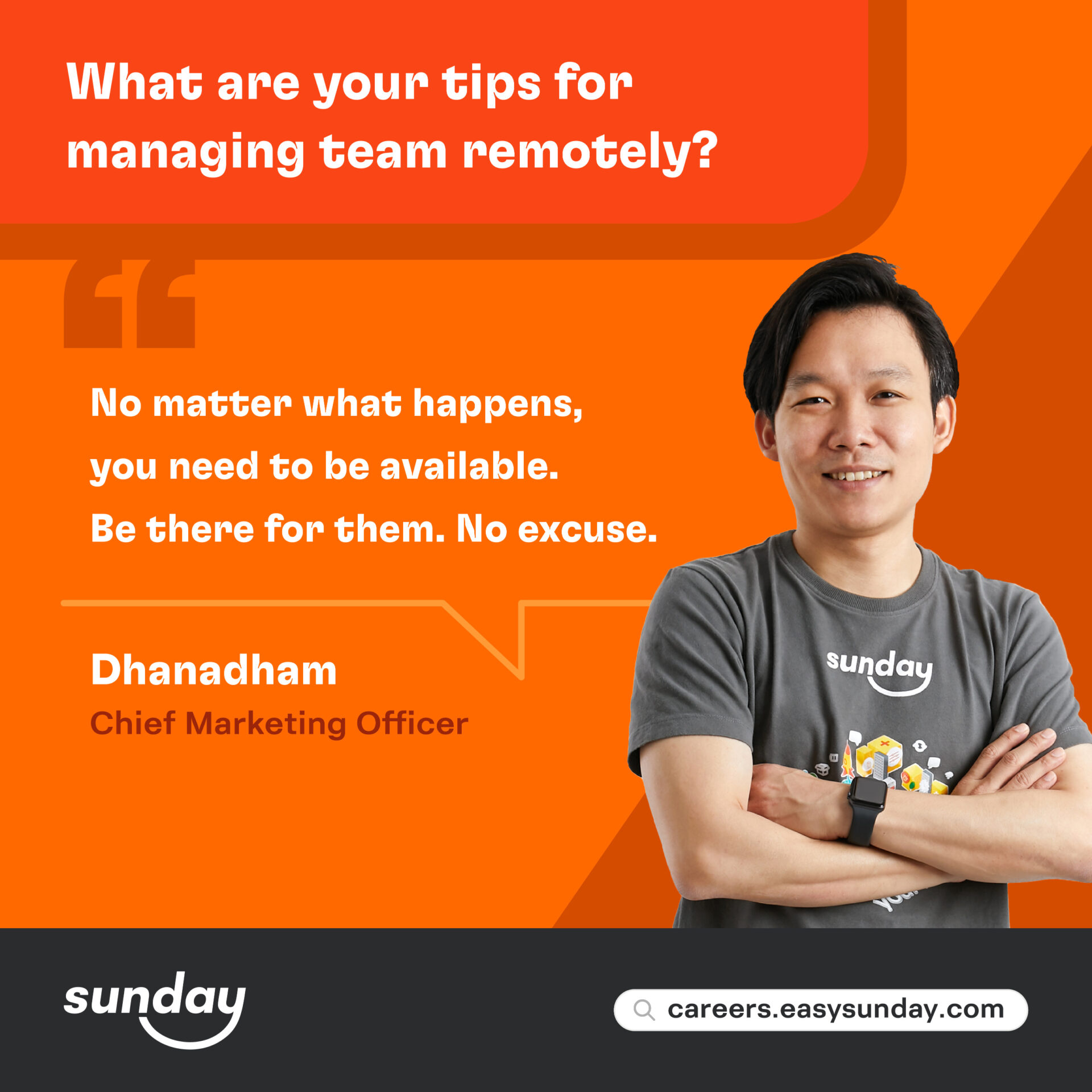Managing a team is never easy, especially when we are in the Hybrid era (and also when full of diversity!) where we are shifting between working from home and working from the office. So we would love to share some tips about managing a team remotely, directly from our Leadership team from the Bangkok office!

1. Suradej (Tae)
My key elements of managing the team could be described in one easy sentence “Keep the team engage”. By means of engaging the team, I have been executed a few of these actions.
- Challenge: I’ve learned people like a balance. A bit of pressure and a sense of control. Sometimes if you let the team flow at their own pace, it will only get slower as people can get tired of doing the same thing repeatedly. When giving them some challenges like new things to explore, some hard bugs to fix, or a rush deadline, it turns out to me that they feel more valuable to the team/company, they learn something new, or they have successfully overcome some obstacles which could help boost energy for them to keep moving forward. We also practice celebrating wins more often, whether it is big or small. I could see that it has fostered the team to keep going in this hard time for all of us.
- Keep the door open: The manager or the leader needs to keep their door open for anyone in the team to be able to reach out to when they are in need. Whether it is a physical or virtual door. With the help of the technologies, I can see that we can do this more effectively than ever. I put it in 2 ways; push and pull. For the push side, regular 1-on-1 catch-up with each of the team helps open the bridge. We can talk privately more openly to track down any obstacles they are facing whether it is work-related or personal issues. On the pull side, with a successful bridge we are opening, you will be on the top of the list of people they will reach out to when they are seeking help, which is preferable for me. I could tap in at the right time and could help them solve the issue earlier.
- Work-life separation: You might have heard the term on work-life balance or work-life integration. I choose neither of those. My principle is work-life-separation. Working from home is automatically integrate people’s life into their work and we need no more integration to push it further. Always keep in mind that having an air-con room, proper working station, high-speed internet or even a private room to work at home is a privilege that not all the team have access to. I always think that they have already put an effort to continue work on the task assigned, they are a grown-up adult with high discipline, and they keep producing high-quality work. Then there is no need to push them to clock in or clock out now and then. Sometimes when they are too engaged, they are sitting in the same room, same chair, morning to midnight. That is the time I will go in and tell them to give themselves a break. It could be just going out to the balcony, to the toilet or just getting some coffee and relaxing. When you are done at work, my rule is not to do any entertainment (whether it is Netflix or reading e-books) on the working laptop or smartphone. Taking our eyes off the screen sometimes helps recover our brain from the fatigue we have accumulating during the day, and it greatly helps avoid burn-out or brown-out syndrome.

2. Chatchai (Tom)
I delegate the authority to the team. Let them decide and take action based on the team consensus which aligns with the company’s direction. Even if they made it the wrong way, it’s ok, we could learn from our mistakes together. The key is that we should trust each other no matter what happens.
I don’t track their working hours but the deliverables instead. Again, we trust each other and allow them to have flexible working hours – everyone has freedom to craft their own working hours / to take a break / personal time.
Working from home may lead to an unbalanced work / life habit. I did encourage them to take leave when possible – like when the project schedule was not so tight. So they could refresh themselves and come back with higher energy.
You may wonder if all of these really work? Yes, it really works! but it depends on the maturity of the team members too.

3. Techavit (Top)
In my opinion, communication is one of the most important factors in managing a team remotely. Obscure communication can lead to misinterpretation and misunderstanding. You cannot observe the expression of the listener and thus cannot fully capture if he understands what you are trying to convey. Furthermore, remote communication required the listener’s interaction even more. You need to know your team and what their style of communication is so that you can detect if the team understands and is aligned on the same thing.
Another thing to consider is information sharing. Working remotely forces the team to communicate via the direct message and it strictly limits the information sharing and involvement across team members. To make this effective, information that is relevant to the team should be shared in the group thread. Furthermore, when multiple people start replying at the same time and the text starts to grow, the team should move the discussion to a conference call instead.
Lastly, regular check in is needed. The team lead should have a daily catchup of how the team members are doing and if there are any roadblocks. Team members must also be proactive in raising concerns and asking questions.

4. Dhanadham (Na)
TIP 1 – OVER COMMUNICATION
Double up everything. If you used to spend 2 hours a day to communicate and align, then spend 4 hours when you work remotely. It is very easy to miss communicate or have misalignment when we use email, Zoom or Slack. As a manager, it is your job to make sure that we sail in the same direction.
TIP 2 – FREEDOM COMES WITH GOOD DISCIPLINE
Set rules to start off the day and end the day. Rule to start off the day will ignite the team to start thinking “what do I have to complete today” then their brain will start working automatically. It will also become their to-do-list for today. Make the team says 3 things they want to complete today on VIRTUAL CALL. End the day with a quick check in, up to your convenience either call or type, to recheck the work. (I prefer type because it is easier to track and comment than verbal. No need to check in during the day, treat them like adults.)
TIP 3 – MAKE SURE YOURSELF IS ALWAYS AVAILABLE
No matter what happens, you need to be available. Make sure you have all the necessary apps on your phone, laptop. Make sure your work and team’s work are accessible on cloud 24/7. Make sure your devices have enough juice or you may need spare batteries. Missing out one hour will cause a lot of problems for the team and others who are waiting for your decisions. Be there for them. No excuse.
TIP 4 – WORK HARD ANYWHERE
Just be able to work hard anywhere. They can work on the mountain as long as they are connected.
Most of these tips are able to apply to both worlds, the core of tips are the same because you don’t need to smell people to manage them! (said by Job – Co-founder and CEO from remote)
Sunday has been working from home since the beginning of the pandemic and we decided to implement a Hybrid policy where employees can freely choose where to work.
If this is something you are looking for, check out our vacancy from https://ezsun.co/careers




